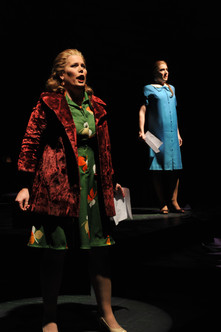FWO Archives: Tom Cipullo's 'Glory Denied' Composer, Director, Author Program Notes (2013 Festival)
- Fort Worth Opera
- Aug 4, 2020
- 8 min read
No holds barred. No apologies. Just the brutally honest recollections of America's longest-held Vietnam prisoner-of-war. Based on the best-selling book by Tom Philpott.

Glory Denied Synopsis
by composer Tom Cipullo
Tableau One: In Captivity
Colonel Floyd James (Jim) Thompson, America's longest-held prisoner of war, looks back on his years as a captive. He sees himself as a young man and recalls episodes from his nine-year ordeal: escape attempts, torture, the overwhelming loneliness of four years in solitary confinement. and being forced to sign a propaganda statement. Through it all, he finds the strength to survive in memories of his wife and family. He recalls every letter his beloved Alyce sent to him before his capture.

As Thompson thinks on his idealized wife, Alyce receives the news that his surveillance plane has been shot down. Filled with fear and bitterness, she soon begins a relationship with another man (Harold), eventually moving in with him and telling the children that their father has died. Alyce denies permission for Jim's name to be released to the public, not even for one of the POW bracelets that were common at the time. She consults a lawyer in an effort to have him declared legally dead.
As the tableau nears its conclusion, Thompson finds comfort in the 23rd Psalm as themes from the opera swirl around him. On his last word ("forever"), he is freed from prison, and a reunion with Alyce, inevitable and tragic, awaits.

Tableau Two: Welcome Home
The POW's are released and Jim returns home. The Pentagon announces another man, a Navy pilot as the longest-held prisoner. Excerpts from the Paris Peace Accords interrupt the prewar memories of Jim and Alyce. Jim reads a letter of welcome from President Nixon, the text noting ominously that "Some things about America may appear to have changed since your departure." Alyce meets Jim and confesses. She offers to disappear if that is what he wants, but only after he hears her out. Jim decides to attempt reconciliation. He notes how the nation has become different during his ordeal, at first mentioning improvements in material items and civil rights, but inevitably concluding with disdain for the new permissiveness and for his wife's infidelity. Soon, the couple begins to, fight, and Jim complains, "You're not the Alyce I left.'' For her part Alyce asserts her independence, refusing to be the docile obedient wife. She tells of what her life was like during his absence, of the callous behavior of neighbors and family, of late-night crank calls from malicious strangers, of her fear and loneliness.
Read the TheaterJones review of Glory Denied, by Gregory Sullivan Isaacs HERE.

Jim visits the church where Alyce and he were married and speaks to the congregation. He tells how he survived his ordeal, stressing his "faith in God, country, and the love of a good woman." Alyce too, both young and old, speaks simply of how she survived. Afterwards, Jim tells Alyce that he has come to forgive her, that all his bitterness is gone. Alyce responds that she does not care if he forgives her or not. Alyce asks, "What have I done that calls for forgiveness?"

Jim sits alone in his study. He has separated from Alyce for good. Illness has ended his military career. He asks himself over and over, "What to do today?" He finds consolation in the phrase, "One day at a time," just as he did when he was a prisoner. Jim tries to stay positive and confident. but bitter feelings keep intruding. He struggles to forgive, but concludes, "Everyone else had a bracelet.''
Composer's Notes
by Tom Cipullo
In 2001, while in residence at the Mac Dowell Colony, I came across the New York Times review of Tom Philpott's Glory Denied. Immediately, I was intrigued. "Indeed, it is not too much to say," the review by Richard Bernstein stated, "that Glory Denied ... encapsulate[s] something of the moral essence of the Vietnam War and the imperishable bitterness of the war's legacy."

For years, I had wanted to create a music drama that would address contemporary issues, one that would take ordinary people and place them in an extraordinary situation. This story, with all its suffering, heroism, selfishness, and dignity, struck me as completely and overwhelmingly operatic. Of course, crafting the libretto would present a huge number of challenges. How might I reflect the difference between Alyce and Jim's memories of her? I settled on having two singers play twin versions of the character. One would represent Jim's idealized vision, while the other would show what Alyce was actually doing and thinking while Jim was a prisoner. Two versions of Alyce led me to consider having Colonel Thompson portrayed by two singers. Young Jim would live through these events, while the older character would recall them from a distance. This casting would allow me multiple points of view, something that I might make good use of in crafting a large number of ensembles. Perhaps the biggest challenge in writing the work was how to make Alyce a real, comprehensible, three-dimensional person. Her actions during Jim's ordeal were nothing short of shocking. Still, when Alyce sings, her music must be so beautiful and persuasive that people will say, "Yes, if I had been alone with four children - the last born the day my husband was captured - perhaps I could have done that too." I am no moral relativist. I believe strongly that behavior can be right or wrong. But my own memories of the time remind me that many good people did things they regret during the Vietnam era. It was as if there was a great madness in the land, and everyone, it seems, simply did the best they could.
Watch the Glory Denied trailer below!

For this latest production of Glory Denied, Fort Worth Opera's General and Artistic Director has assembled a cast and crew of talented, visionary, and deeply-committed artists. My hope is that a work on such an unusual subject will bring out untraditional audiences. Further, I hope that those new to opera will find in the work's ensembles and arias a bridge to a fascinating, complex, and emotional time. Glory Denied is a distinctly American story. I am thrilled that it will be making its Texas premiere in the sure hands of the extraordinary Fort Worth Opera.
The opera Glory Denied is dedicated to my dear friend Steven Burke. Finally, I would like to express my deepest appreciation to Tom Philpott. His generosity of spirit is truly an inspiration.
See what Opera News had to say about Glory Denied HERE.
Author’s Notes:
From Book to Opera
by Tom Philpott
Seventeen years had passed between my first meeting in 1984 with retired Army Colonel Floyd "Jim" Thompson, the then little known yet longest-held prisoner of war in American history, and publication of Glory Denied, my book about Jim and his wife Alyce - a searing oral history on their wartime experiences and how those experiences destroyed their marriage and family. Jim had survived nine years of brutal captivity, including five years in solitary confinement and multiple escape attempts for which he was awarded the Silver Star, only to return to a wife and to a nation dramatically changed during his absence and with little appreciation for what he had endured.

I first found Jim, a stroke victim and disabled retiree, living alone in Key West Florida. By then, given his disabilities, Jim could not tell his own story well. So I set out to uncover it, relying not only on multiple interviews with Jim but on unpublished interviews he gave soon after his return in 1973, on letters home, on psychiatric records, and on my own interviews with more than 160 persons who knew part of his story. They included childhood chums, neighbors, fellow soldiers, and former POWs who saw the horror, and the heroism, of his last years of confinement. Importantly I also interviewed at length Alyce and their children. Raising three toddlers, and pregnant with their fourth child when Jim left for Vietnam, Alyce saw her world collapse when Jim was lost in a distant war she and most Americans knew little about.

I chose oral history to tell their story because their "voices" were more honest, poignant, and jarring than any third-person narrative. I didn't want to lose them. Indeed, for nearly a decade I thought the tragedy of Jim and Alyce Thompson could not be told more movingly - until I heard Glory Denied the opera from the brilliant composer Tom Cipullo.
Cipullo's musical score is beautiful and chilling. But what overwhelmed me were the choices he made in excerpting Jim's and Alyce's voices for his libretto, weaving them into a series of compelling revelations, capturing in song all that they longed for and all that they lost to war, cruel isolation, societal changes, and their own imperfections. Cipullo's opera returns us to a transformative era in our nation's history, presents two ordinary humans buffeted by extraordinary circumstances, shows dreams bumping up against the harshest realities, and lets a uniquely-American tragedy unfold.
I expect Glory Denied to soar in Texas, given the quality talent that the Fort Worth Opera has assembled for this regional premiere. I know the late Jim Thompson would be very surprised, very moved, and very proud.

Director’s Notes
by Dean Anthony
The journey to grasp such TRUTH in Glory Denied and then find a way to communicate it to the audience has had an amazing impact on my life. Knowing full well that one person's thoughts alone would not be enough to convey the scope of this story, I have eagerly anticipated coming to Fort Worth and connecting my ideas with those of composer Tom Cipullo, author Tom Philpott, the cast, and the entire production team at Fort Worth Opera. I have wanted to hear how the truth of the story and of their own experiences during the Vietnam era affected each of them, and I have deeply valued their input.
Being born in the early 1960's, my view of Vietnam was much like Jim Thompson's son. In one of the interviews in Tom Philpott's book, Jim Jr. said as a nine year old he didn't want to think about a war. He just wanted to go outside and play. Sadly, I think that was a recurring theme for many Americans at that time. We think we know the history and the stories, but in this production, we actually get to live one whole story. The path that both Jim and Alyce take is difficult to process, and one that I don't feel any of us can even fully comprehend. All we can do it tell it.
Tom Cipullo has given us the characters of Jim and Alyce, younger and older versions, in a cast of four. It's a gift to a director and a challenge at the same time. We see them in various stages of life, but also see them outside of reality, much like a Greek Chorus. Interviews. Interrogations. Struggling with paperwork that inundated daily life. Raising children. Isolation. Change. Finding hope in any way possible. Freedom. Moving on. Survival... Survival, it all comes down to that one simple concept - the one thing that they both had to do.

CAST AND CREATIVE TEAM
Opera by Tom Cipullo
Based on the book Glory Denied by Tom Philpott
Sung in English
Featuring musicians from the Fort Worth Symphony Orchestra
CONDUCTOR Tyson Deaton*
DIRECTOR Dean Anthony*
SCENIC DESIGNER Richard Kagey
COSTUME DESIGNER Stephen Chudej*
LIGHTING DESIGNER Sean Jeffries*
MAKEUP AND WIG DESIGNER James P. McGough
STAGE MANAGER Adam Schwartz
ASSISTANT DIRECTOR Andrew Nienaber
REPETITEUR Stephen Carey*
The Cast in Order of Vocal Appearance
OLDER THOMPSON Michael Mayes
YOUNG THOMPSON David Blalock*
YOUNG ALYCE Sydney Mancasola*
OLDER ALYCE Caroline Worra*
*Debut Season
GALLERY
photos by Ellen Appel






















































